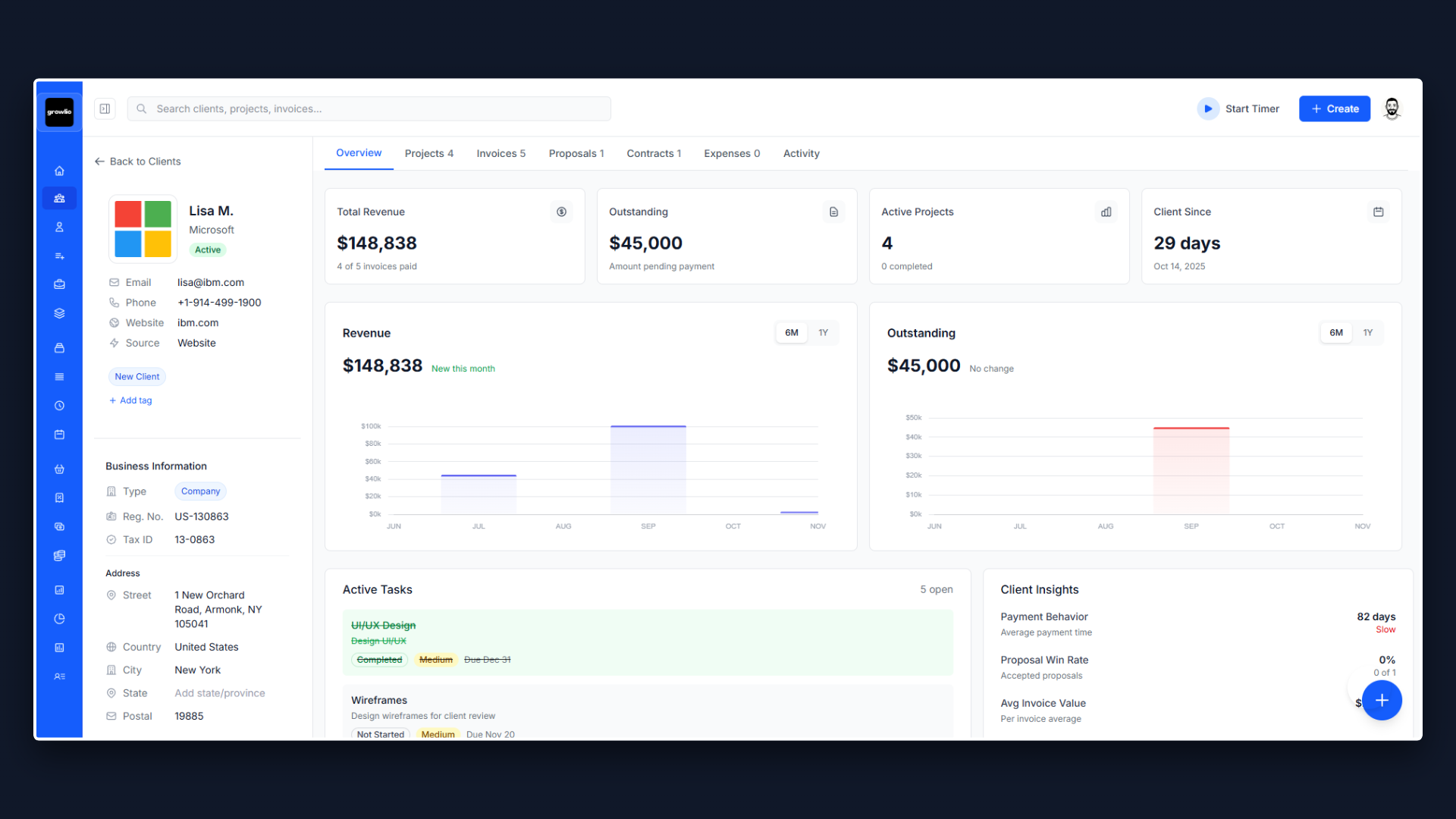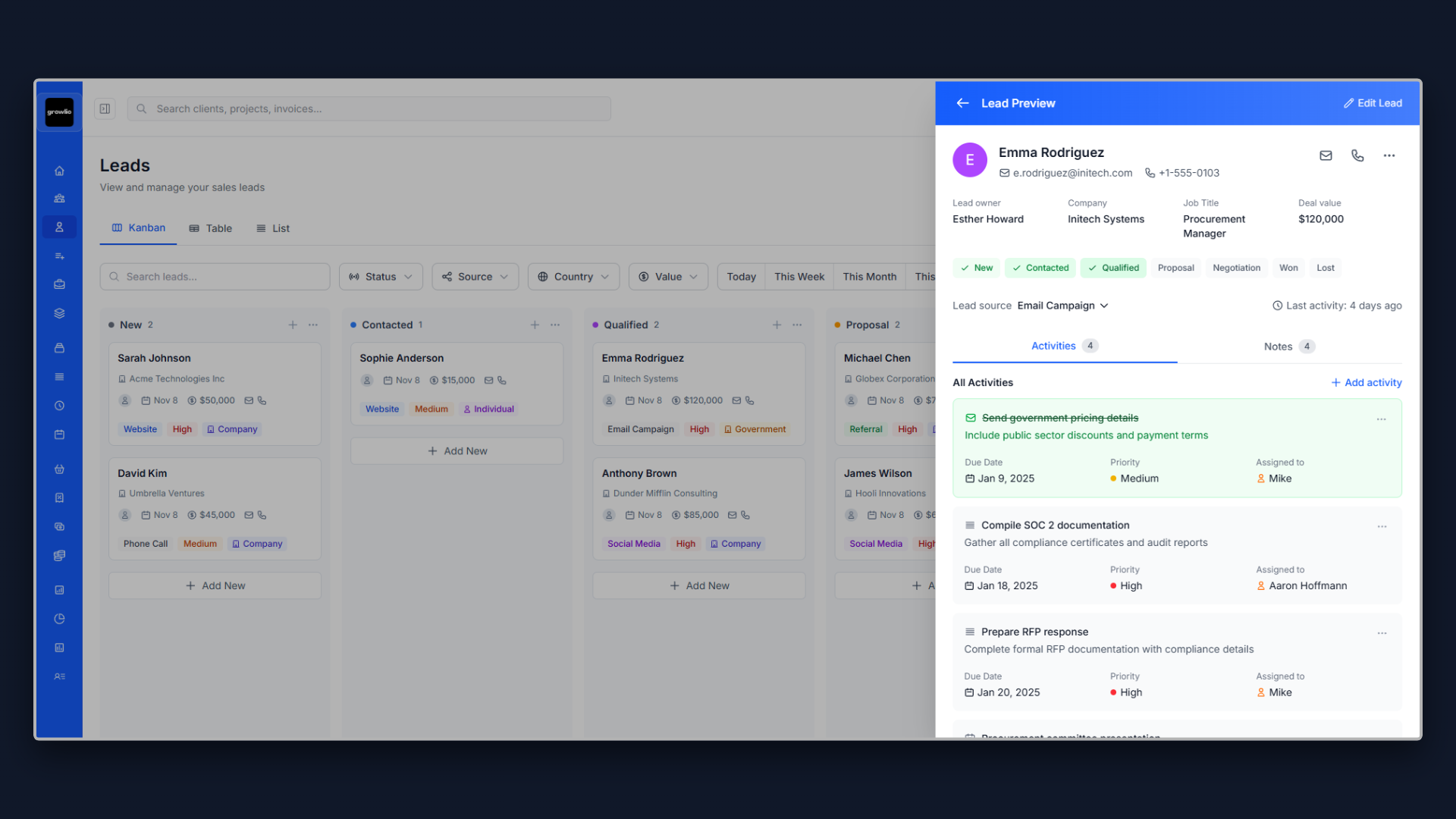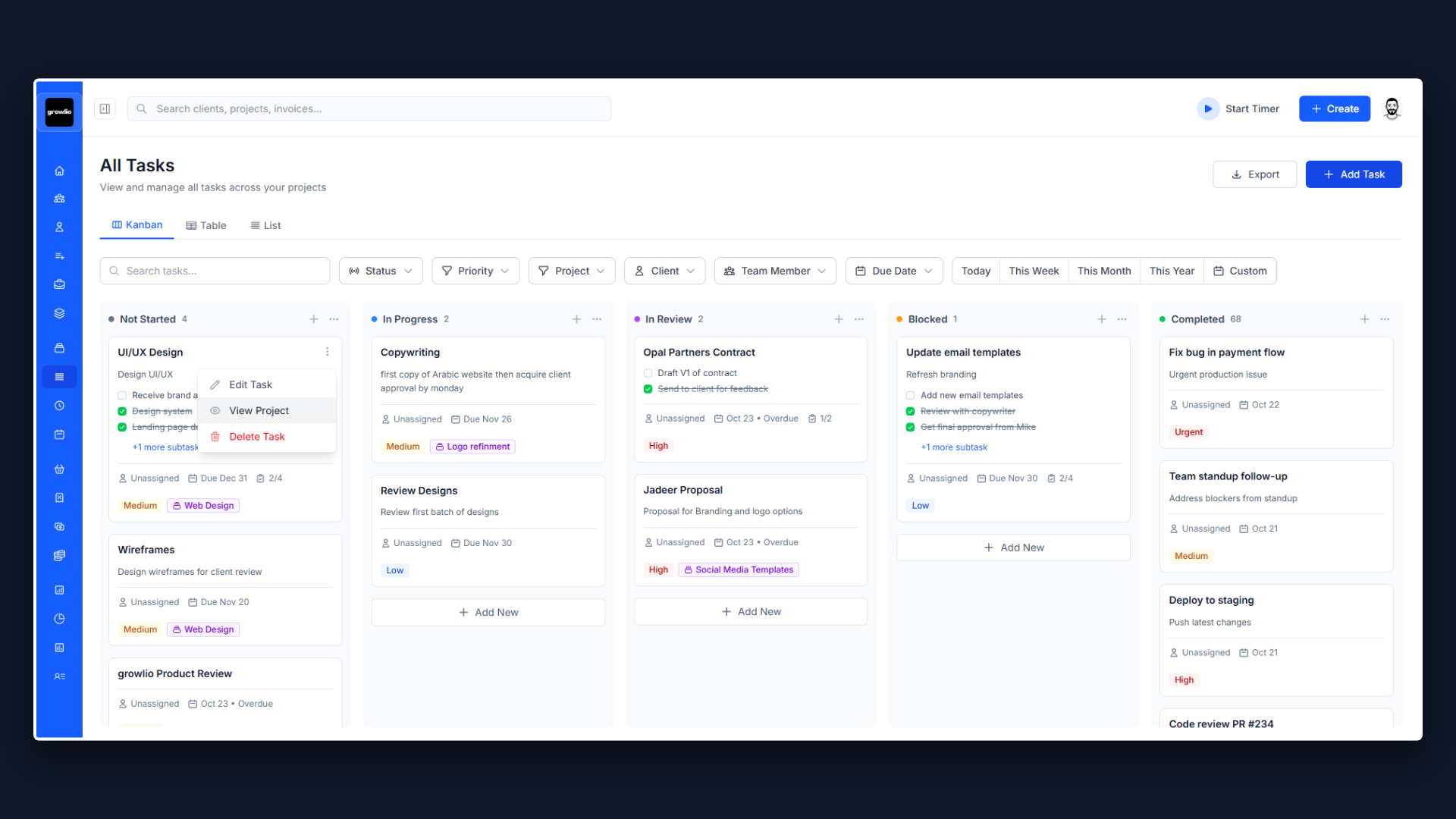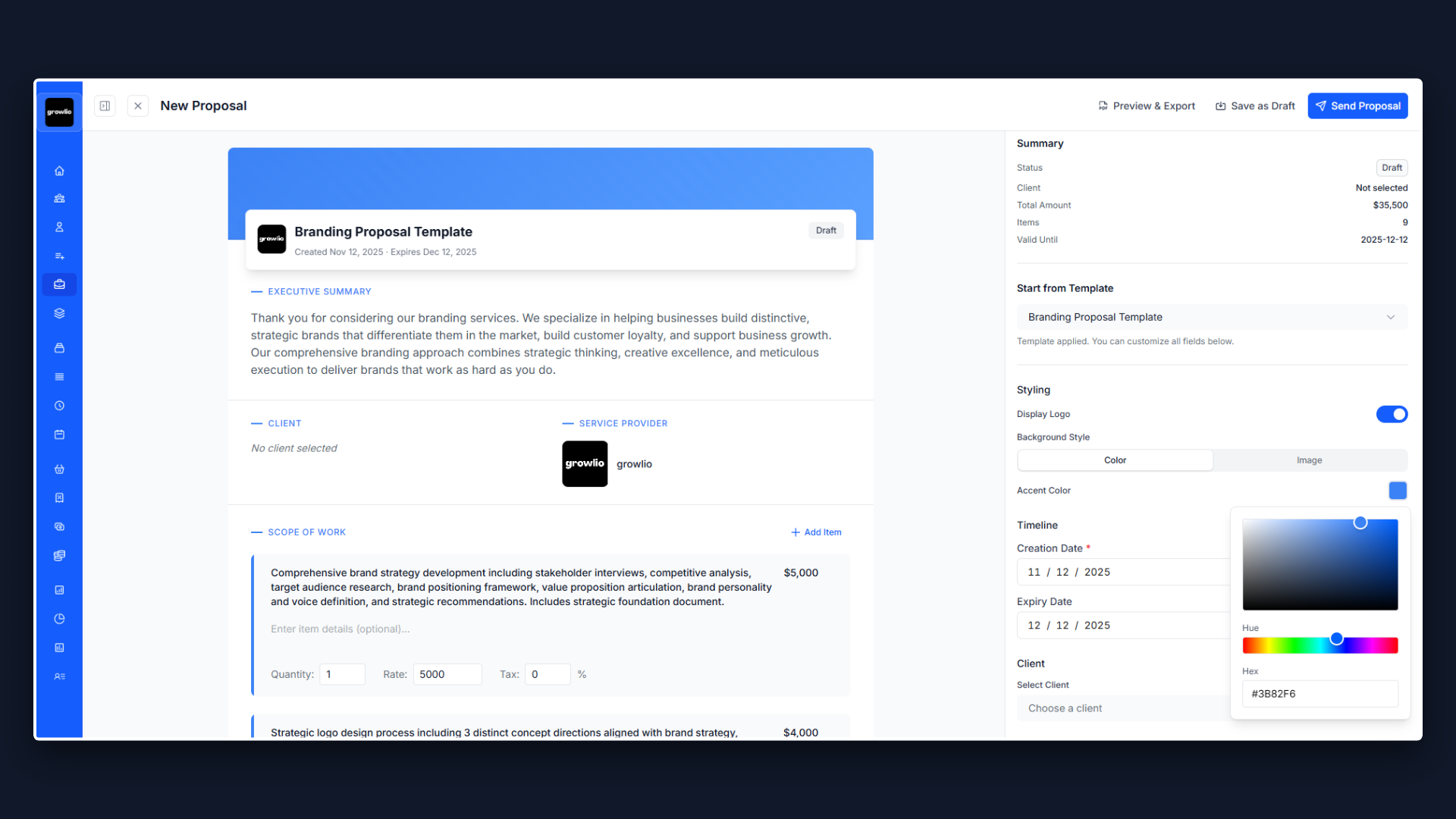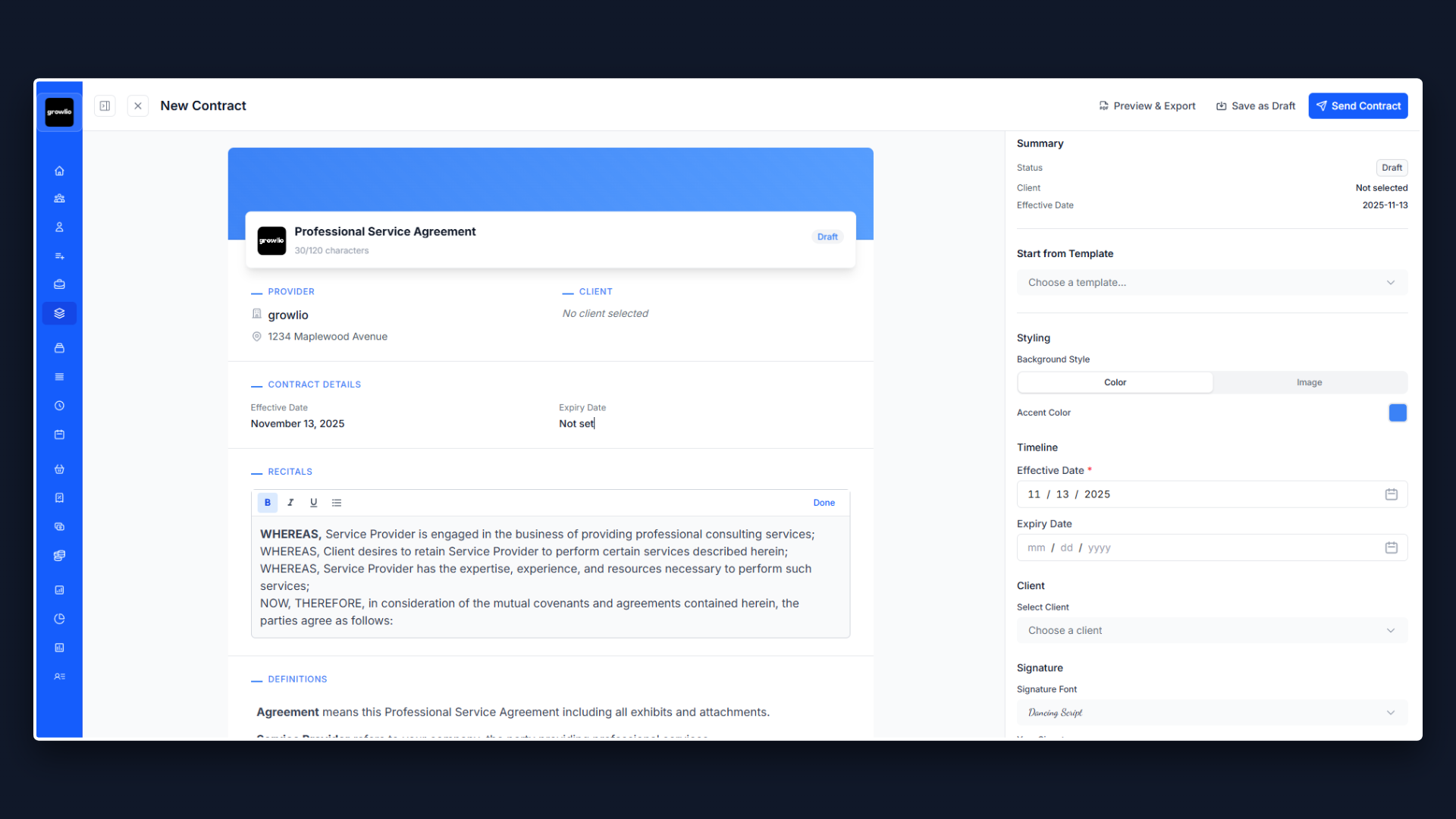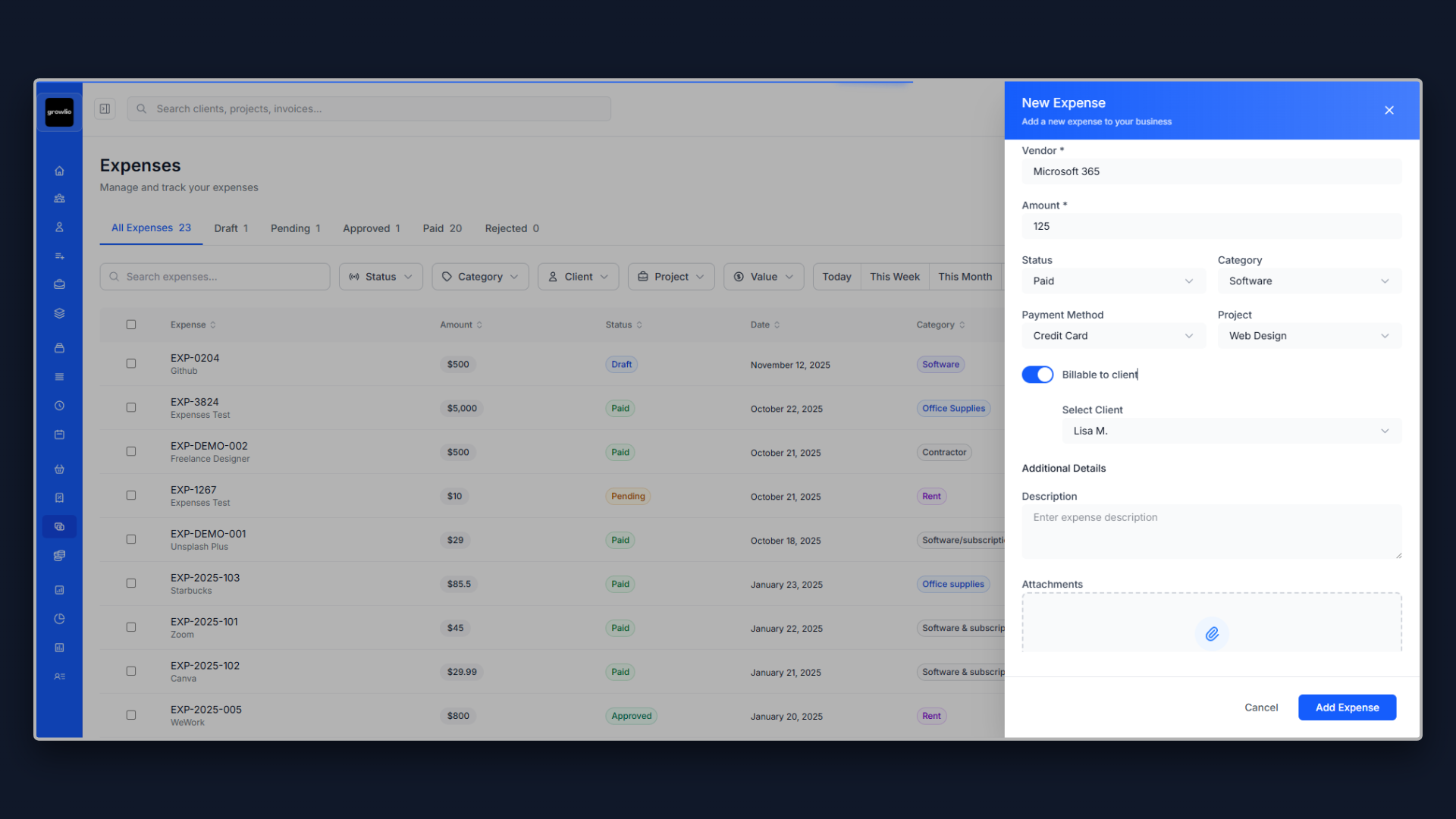Why Your Accounting Proposal Determines Whether Clients Trust You With Their Finances
In accounting services, you are not just crunching numbers—you are protecting your clients from IRS penalties, helping them make informed business decisions, and ensuring their financial house is in order. Before a business owner or individual entrusts you with their financial records, tax filings, and sensitive financial data, they need confidence you will be accurate, compliant, proactive, and trustworthy.
The accounting services industry generates over $140 billion annually in the U.S., with every business and many individuals requiring some level of accounting support—from basic bookkeeping to complex tax planning and CFO advisory services. Yet 60% of small businesses report frustration with their accountants, citing poor communication, reactive service, unexpected bills, or lack of strategic guidance. The difference between accountants charging $150/hour and those commanding $300+/hour often comes down to how they present their expertise, systems, and value in proposals.
Your accounting proposal needs to accomplish several critical objectives simultaneously: demonstrate technical expertise and knowledge of relevant tax laws and regulations, prove you have systems to ensure accuracy, timeliness, and compliance, showcase proactive advisory capabilities beyond compliance work, address concerns about cost, communication, and data security, and differentiate yourself from commodity bookkeepers and large impersonal firms. This is your opportunity to transform from a compliance vendor into a trusted financial advisor who enables business growth and financial security.
1. Open With Financial Risks and Costs, Not Your Credentials
The biggest mistake accountants make is leading with credentials: "I am a CPA with 15 years of experience..." Your prospect does not care about your credentials yet. They care about the financial risks they face and the cost of poor financial management.
Start by demonstrating you understand what is at stake financially. For a small business owner, open with: "Without accurate bookkeeping and tax planning, your business faces multiple financial risks: IRS penalties averaging $5,000-$25,000 for late or incorrect filings, overpaying taxes by 15-30% due to missed deductions and credits, cash flow problems from poor financial visibility leading to missed opportunities or emergency borrowing at high rates, and inability to make data-driven decisions about pricing, hiring, or investment because you do not know your true profitability. The cost of poor accounting is not just the hourly rate you save by doing it yourself—it is the penalties, overpaid taxes, poor decisions, and lost opportunities that compound over time. You need an accountant who prevents problems proactively, not just fixes them after the fact."
For an individual with complex tax situation: "With rental properties, investments, and self-employment income, your tax situation is complex enough that mistakes are costly. Common errors we see: missing depreciation deductions worth $5,000-$15,000 annually, incorrect classification of income triggering self-employment tax unnecessarily, failure to maximize retirement contributions reducing taxable income, and audit triggers from improper documentation or aggressive positions. The difference between a $500 DIY tax software return and a $2,500 professional tax preparation is not $2,000 in cost—it is $10,000-$20,000 in missed tax savings and risk reduction annually. You need a tax professional who optimizes your situation strategically, not just fills out forms."
This risk-focused opening immediately reframes the conversation from "cost of hiring an accountant" to "cost of NOT having proper accounting." Now they are ready to hear your solution.
2. Define Your Service Scope With Precision
Scope ambiguity creates problems in accounting engagements. Clients expect you to handle everything financial. You feel overworked and underpaid. Prevent this by defining scope clearly.
Structure scope definition precisely: Bookkeeping Services (Included): Monthly transaction categorization and reconciliation (bank accounts, credit cards). Accounts payable and receivable management. Monthly financial statements (P&L, Balance Sheet, Cash Flow). Payroll processing and tax filing (federal and state). Sales tax calculation and filing. QuickBooks Online setup, training, and ongoing support. Monthly close process and variance analysis.
Tax Preparation Services (Included): Business tax return preparation (1120S, 1065, Schedule C). Personal tax return preparation (1040 with all schedules). State and local tax returns. Tax extension filing if needed. Tax payment calculation and reminders. Representation in case of IRS correspondence or simple inquiries. Tax organizer and document collection process.
Advisory Services (Included in Premium Packages): Quarterly financial review meetings and strategic planning. Tax planning and optimization strategies. Cash flow forecasting and management guidance. Profitability analysis by product, service, or customer. KPI tracking and dashboard development. Business structure optimization (LLC, S-Corp, C-Corp analysis). Exit planning and succession considerations.
Explicitly Outside Standard Scope: Audit representation (requires separate engagement and higher fees). Complex tax situations (international tax, transfer pricing, multi-state nexus beyond basic filing). Forensic accounting or fraud investigation. Valuation services for business sale or estate planning. Litigation support or expert witness services. Payroll tax problem resolution (separate engagement if prior issues exist). Historical cleanup of years of neglected books (quoted separately as project).
Client Responsibilities: Provide bank and credit card statements by 5th of following month. Classify transactions with unclear business purpose. Provide receipts and documentation for expense substantiation. Respond to questions within 48 hours to maintain timeline. Notify us of significant business changes (new revenue streams, large purchases, entity changes). Provide tax documents (W-2s, 1099s, K-1s) by February 15 for timely filing.
Our Response Time Commitments: Routine questions: Response within 24 business hours. Monthly financials: Delivered by 15th of following month (if you meet document deadline). Tax returns: Delivered 2 weeks before filing deadline. Urgent matters: Same-day response during tax season for active clients. Year-round availability: Not just available January-April, unlike some firms.
This exhaustive definition prevents scope creep and sets realistic expectations about responsibilities on both sides.
3. Demonstrate Industry and Tax Expertise Specifically
Generic accounting claims do not differentiate you. Show specific expertise relevant to their situation.
Present targeted expertise: Technical Qualifications: CPA licensed in [state] since [year], in good standing. [Specialized certifications: CFP, EA, PFS if applicable]. Member of AICPA and [state CPA society]. 40+ hours annual continuing education exceeding requirements. Specialized training in [their industry or tax situation: real estate, e-commerce, professional services, etc.].
Industry Specialization: 60% of our clients are in [their industry: e-commerce, professional services, real estate, etc.]. We understand industry-specific issues: [specific examples like inventory accounting for e-commerce, 1099 management for professional services, depreciation strategies for real estate]. We know which deductions and credits apply specifically to your business. We benchmark your metrics against industry standards to identify opportunities.
Tax Strategy Expertise: Proactive tax planning, not just compliance: We model tax scenarios before year-end to optimize your position. We identify timing strategies for income and expenses. We ensure you maximize retirement contributions (Solo 401k, SEP IRA, defined benefit plans). We advise on entity structure optimization (many businesses save $5,000-$15,000 annually by switching from LLC to S-Corp). We plan for major events (equipment purchases, real estate transactions, business sale).
Technology and Systems: QuickBooks Online certified ProAdvisor (or your platform). Expertise in connecting apps (Bill.com, Gusto, Stripe, etc.) for automation. Cloud-based systems allowing real-time collaboration and access. Secure document portal for tax document sharing. Dashboard and reporting tools providing visibility into key metrics.
What Makes Us Different: Proactive communication: We reach out quarterly (minimum) to discuss your situation, not just at tax time. Tax planning focus: We save clients an average of $8,000-$15,000 annually through proactive strategies. Industry expertise: We speak your language and understand your business model. Fixed pricing: No surprise bills—you know exactly what you will pay. Responsive service: We actually answer the phone and return calls same day.
This specific expertise presentation proves you are not a commodity accountant but a specialist who understands their world.
4. Outline Your Process and Systems
Clients fear accountants who are disorganized, miss deadlines, or make errors. Demonstrate your systematic approach.
Present your methodology clearly:
Monthly Bookkeeping Process: Week 1: Receive bank and credit card statements and receipts from client. Import transactions into QuickBooks and categorize. Identify unclear transactions and send questions to client. Week 2: Reconcile all accounts to bank statements. Process payroll and remit taxes. Calculate and prepare sales tax filing. Week 3: Generate financial statements and variance analysis. Review for unusual items or errors. Prepare monthly summary and insights. Week 4: Deliver financial package with summary email highlighting key points. Schedule quarterly review call if applicable.
Tax Preparation Process: January: Send tax organizer to client with document checklist. Set up secure document sharing folder. February: Client provides W-2s, 1099s, receipts, and completed organizer. We review for completeness and request missing items. March: Prepare draft tax return with projections. Review with client via video call explaining strategies and results. Client approves or requests changes. Finalize return, e-file, and provide copies. April: File extensions if needed for complex situations. File final returns and provide tax payment instructions.
Quality Control: Every tax return reviewed by second CPA before filing (two-eye review). Automated diagnostic checks for common errors and missed opportunities. Comparison to prior year to identify unusual changes. Documentation of tax positions and support for deductions. Professional liability insurance ($1M coverage) protecting both of us.
Tax Planning Process (Quarterly for Advisory Clients): Review year-to-date financials and project year-end position. Model tax scenarios and identify optimization opportunities. Discuss major planned transactions or business changes. Provide written action items with deadlines. Follow up on implementation before year-end.
Communication Cadence: Monthly: Financial statements delivered with summary email. Quarterly: Advisory call for strategic clients (30-45 minutes). Tax season: Weekly updates on return status. Year-round: Proactive outreach when we identify opportunities or issues. Always: Email and phone access for questions (response within 24 hours).
This systematic approach demonstrates professionalism and builds confidence in your reliability.
5. Present Transparent, Value-Based Pricing
Hourly billing creates anxiety and misaligned incentives. Present clear fixed pricing with defined scope.
Outline pricing clearly: Package 1: Bookkeeping Only - $500-$1,200/month
Based on: Transaction volume (under 100/month: $500, 100-200: $750, 200-500: $1,200). Includes: Monthly bookkeeping and reconciliation, financial statements, payroll processing (up to 5 employees), sales tax filing, QuickBooks support. Does not include: Tax preparation (quoted separately), advisory services, catch-up work. Best for: Businesses needing clean books but handling tax elsewhere or using different firm.
Package 2: Bookkeeping + Tax Prep - $1,500-$2,500/month
Monthly retainer: $1,000-$1,800 for bookkeeping (based on volume). Annual tax prep: $2,500-$4,000 for business return, $800-$1,500 for personal return. Total annual: $18,000-$26,000 depending on complexity. Includes: Everything in Package 1 plus business and personal tax returns, basic tax planning, year-round tax support. Does not include: State returns beyond 1-2 states, amended returns, audit support. Best for: Most small businesses wanting comprehensive accounting and tax service.
Package 3: Complete CFO Advisory - $3,000-$5,000/month
Includes: Everything in Package 2 plus quarterly strategic planning meetings, cash flow forecasting and KPI dashboards, profitability analysis and pricing guidance, tax optimization strategies throughout year, business structure and entity planning, unlimited email and phone access for financial questions. Best for: Businesses $500K-$5M revenue wanting strategic financial partner, not just compliance.
Tax Preparation Only (No Bookkeeping): Business returns: $1,500-$4,000 depending on entity type and complexity. Personal returns: $500-$2,000 depending on complexity (rentals, investments, multi-state, etc.). State returns: $200-$400 each beyond first state. Amended returns: $800-$1,500. Best for: Businesses with in-house bookkeeping wanting professional tax preparation.
Project-Based Services: Bookkeeping catch-up: $100-$150/hour, estimated after review of records. QuickBooks setup: $1,000-$2,500 depending on complexity. Sales tax audit support: $200-$300/hour. IRS audit representation: $250-$350/hour. Entity formation and structure planning: $1,500-$3,500.
What Affects Pricing: Transaction volume and complexity. Number of entities, bank accounts, revenue streams. Industry-specific requirements (inventory, job costing, etc.). Multi-state tax filing requirements. Payroll complexity (number of employees, states, benefits). Quality of your record-keeping (organized clients cost less to serve).
Payment Terms: Monthly packages: Auto-pay on 1st of month via ACH or credit card. Tax preparation: 50% deposit when we start, balance due before filing. Project work: 50% deposit, balance on completion. Discounts: 5% discount for annual pre-payment, 10% discount for referrals that become clients.
This transparent pricing lets clients budget accurately and eliminates billing surprises.
6. Address Data Security and Confidentiality
Clients are entrusting you with their most sensitive financial information. Address security proactively.
Outline security measures: How We Protect Your Financial Data:
Secure Systems: Cloud-based accounting software with bank-level encryption (256-bit SSL). Secure client portal for document sharing (no email attachments with SSNs). Multi-factor authentication required on all systems. Regular security updates and patches. Encrypted backups stored in secure, redundant locations. SOC 2 compliant hosting for all client data.
Access Controls: Minimum necessary access principle (staff only access what they need). Individual user accounts (no shared passwords). Automatic logout after inactivity. Audit trails tracking all access and changes. Background checks on all staff with access to client data.
Professional Standards: CPA confidentiality requirements and professional ethics rules. Professional liability insurance ($1M malpractice coverage). Member of AICPA subject to professional standards and discipline. Signed engagement letter with confidentiality provisions. We never share client information without explicit written permission.
IRS Security Requirements: IRS-compliant written information security plan (WISP). Annual security training for all staff. Incident response plan in case of breach. Compliance with IRS Publication 4557 safeguarding taxpayer data.
Physical Security: Locked office with alarm system. Secure document destruction (shredding) for paper files. Work-from-home staff using encrypted VPN and secured home networks. Clean desk policy—no client documents left visible.
What We Cannot Guarantee: 100% security (no system is completely hack-proof, but we implement industry best practices). Security beyond our control (your email security, device security). We are transparent about our measures so you can assess risk appropriately.
This comprehensive security discussion addresses a top concern for clients sharing financial data.
7. Showcase Tax Savings and Advisory Value
Compliance accountants are commodities. Advisory accountants are valuable. Show how you save clients money beyond just filing returns.
Demonstrate advisory value: How We Save Clients Money Beyond Compliance:
Proactive Tax Planning Examples: S-Corp election: Many LLCs pay unnecessary self-employment tax. We analyze when S-Corp election saves money (typically $5,000-$15,000 annually for businesses with $100K+ profit). Retirement contributions: We ensure you maximize tax-deferred retirement savings (Solo 401k up to $69,000 annually for 2024, reducing taxes by $15,000-$25,000). Depreciation strategies: Bonus depreciation and Section 179 expensing on equipment and vehicles (often $10,000-$50,000 in first-year deductions). Home office deduction: Properly documented home office saves $3,000-$8,000 annually for self-employed. Health insurance deductions: Self-employed health insurance deduction often missed ($5,000-$15,000 annually).
Strategic Business Decisions: Equipment purchase timing: Buy in December vs. January can shift $20,000+ deduction to current year. Hiring decisions: Understanding tax credits for hiring (Work Opportunity Tax Credit worth $2,400-$9,600 per qualifying employee). Entity structure: Analyzing when to change structure as business grows (LLC to S-Corp to C-Corp). Exit planning: Structuring business sale to minimize taxes (qualified small business stock exclusion, installment sales, etc.).
Financial Insights: Profitability analysis: Which products, services, or customers are actually profitable (many businesses shocked to learn top revenue clients are least profitable). Pricing guidance: Using financial data to set profitable pricing strategies. Cash flow forecasting: Identifying cash crunches before they happen, allowing proactive solutions. Benchmark comparisons: How your metrics compare to industry standards (gross margin, operating expenses, etc.).
Example Client Results: E-commerce client ($800K revenue): Saved $12,000 annually through S-Corp election, optimized inventory accounting reducing taxes by $8,000, and improved profitability 5% through product mix analysis based on our reporting. Professional services client ($400K revenue): Maximized Solo 401k contribution ($69,000), properly documented home office ($6,000 deduction), and optimized health insurance deduction ($14,000). Saved $28,000 in taxes annually. Real estate investor (5 properties): Cost segregation study accelerated $85,000 in depreciation, properly structured rental to qualify for real estate professional status, saved $22,000 in taxes first year. Total fees: $8,000. Tax savings: $22,000. ROI: 2.75x in year one.
This value demonstration justifies premium pricing by showing ROI, not just compliance.
8. Include Client Testimonials and Results
Claims are easy. Proof is powerful. Include 2-3 testimonials showing results you have delivered.
Format social proof clearly: Jennifer S., E-commerce Business Owner
"I was doing my own bookkeeping and using TurboTax, thinking I was saving money. After one year with [Firm Name], I realized how much money I was leaving on the table. They identified $15,000 in missed deductions, restructured my business to save $10,000 annually in self-employment tax, and set up systems that actually save me 10 hours monthly. The monthly fee pays for itself many times over. Plus, I sleep better knowing my books are clean and my taxes are optimized."
Robert M., Consultant
"I have worked with three accountants over 10 years, and [Firm Name] is the only one that proactively reached out with tax-saving ideas. They suggested a Solo 401k that saved me $18,000 in taxes. They caught an error from my previous accountant that would have triggered an audit. They explain things in plain English, not accounting jargon. Most importantly, they are available year-round, not just during tax season. Worth every penny."
Lisa K., Real Estate Investor
"Managing books for 8 rental properties was a nightmare. [Firm Name] set up a system that tracks income and expenses by property, makes tax time simple, and provides reports showing which properties are actually profitable. They saved me $20,000 through cost segregation and proper depreciation strategies I did not know existed. They have paid for themselves 5x over in just two years."
Results We Have Delivered: Saved manufacturing client $45,000 through R&D tax credit they did not know they qualified for. Helped professional services firm transition from LLC to S-Corp, saving $18,000 annually in self-employment tax. Restructured real estate investor holdings to optimize depreciation and deductions, saving $35,000 in first year. Cleaned up 3 years of neglected books for e-commerce client, filed back taxes, and negotiated IRS payment plan avoiding $25,000 in penalties.
These specific testimonials and results prove you deliver measurable value.
9. Differentiate From DIY Software and Commodity Firms
Every prospect considers DIY software or cheap online services. Address this comparison directly.
Explain your value vs. alternatives: Why Not Just Use QuickBooks/TurboTax Yourself?
DIY accounting software has improved dramatically, but it has limitations: What software cannot do: Provide strategic tax planning and optimization strategies. Identify industry-specific deductions and credits you do not know to look for. Catch errors or missed opportunities before they become problems. Advise on entity structure, retirement planning, or financial strategy. Represent you if IRS questions your return. Provide business insights and benchmarking from financial data. Know when your situation requires professional expertise vs. DIY is fine.
Real costs of DIY we have seen: Missed depreciation deductions costing $8,000-$20,000 in overpaid taxes annually. Incorrect classification triggering self-employment tax unnecessarily ($5,000-$15,000 overpaid). Failure to elect S-Corp status when beneficial (ongoing $10,000-$20,000 annual overpayment). Audit triggers from aggressive positions without proper documentation (penalties and interest). Time spent (20-40 hours annually for typical small business owner) worth $2,000-$8,000 in opportunity cost.
When DIY makes sense: Very simple situation (W-2 income only, standard deduction, no investments or side income). You enjoy accounting and tax research. Your time has low opportunity cost. You are willing to accept risk of missed opportunities or errors.
Why Not Use Cheap Online Service?
Online services like [competitor names] offer low prices but provide commodity service: No relationship—you get different person each time, no one knows your situation. Reactive only—they file your return but provide no proactive planning. Limited expertise—often unlicensed preparers with minimal training, not CPAs. No advisory—they do not analyze your financials or provide strategic guidance. Support issues—try calling them with question in July (good luck getting response).
Our approach is different: Relationship-based: Same CPA works with you every year, knows your situation deeply. Proactive: We reach out quarterly with tax-saving ideas, not just at filing time. Expert: Licensed CPAs with industry specialization, not generalists. Advisory-focused: We analyze your financials and provide strategic guidance. Year-round: We answer your questions in July as readily as in March.
This honest comparison helps clients understand the value gap justifying your pricing.
10. End With Clear Next Steps and Engagement Process
Make it frictionless to engage with clear path from proposal to active client.
"We appreciate the opportunity to submit this proposal and hope to become your trusted accounting partner. Proper accounting and tax planning are investments in your financial security and business success—not expenses to minimize.
What Happens Next:
Step 1: Discovery Call (30-45 minutes)
Let us schedule a call to discuss your specific situation, answer questions about our services, and ensure we are a good fit. We will review your current accounting setup, pain points, and goals. You can assess whether our approach and communication style align with your needs. No obligation—this is as much about mutual fit as understanding your situation. [Calendar link] or reply with your availability.
Step 2: Engagement Letter and Onboarding
If we both feel it is a good fit, we will send engagement letter outlining scope, pricing, and terms. You will complete our client information form with details needed to start. We will schedule kickoff call to review systems, access, and processes. For bookkeeping clients: QuickBooks setup or review to ensure proper chart of accounts. For tax clients: Document request list and secure portal setup.
Step 3: Getting Started
Bookkeeping clients: We start with current month (or catch-up project if needed), deliver first financials within 30 days. Tax clients: We review prior returns and documents, identify planning opportunities, prepare current year returns. Advisory clients: Initial financial review and strategic planning session within first month.
Step 4: Ongoing Partnership
Monthly bookkeeping delivered by 15th of following month with summary insights. Quarterly check-ins for strategic planning (advisory clients). Annual tax preparation with proactive planning before year-end. Year-round support via email and phone for questions and guidance.
Current Availability:
Bookkeeping: We can onboard new clients immediately, start with current month. Tax preparation: For 2024 returns, we are accepting clients through February 15 (after that, capacity limited). Advisory: We limit advisory clients to ensure quality—currently accepting 2-3 new clients.
Questions or Want References?
We are happy to provide references from clients in similar situations. We can discuss our approach to your specific tax or accounting challenges. We will clarify any aspect of our services, pricing, or engagement terms. Contact me at [email] or [phone], or schedule call at [calendar link].
Ready to Optimize Your Finances?
The sooner we start, the sooner you will have clean books, optimized taxes, and strategic financial guidance. Looking forward to becoming your trusted accounting partner!"
This clear process with defined next steps makes the decision easy and engagement frictionless.
Final Thoughts on Accounting Proposals
Your accounting proposal is the first demonstration of your professionalism, organization, and communication skills. If it is generic, confusing, or focused only on hourly rates, clients will assume your accounting work will be the same. If it is clear, comprehensive, and demonstrates strategic value, they will trust you with their financial future.
The accountants who win premium clients and build sustainable practices prove they understand financial risks and costs, not just compliance tasks, define scope clearly to prevent misunderstandings and scope creep, demonstrate systems ensuring accuracy, timeliness, and quality, showcase proactive advisory value beyond tax preparation and bookkeeping, present transparent fixed pricing that allows budgeting, address data security comprehensively to build trust, differentiate from DIY software and commodity services, provide social proof through testimonials and results, and make engagement easy with clear next steps and processes.
Every proposal should be customized for the specific client and situation. Reference their specific business model, tax situation, or pain points. Highlight expertise most relevant to their industry or needs. Share examples of similar clients you have helped. Be transparent about pricing, process, and what they can expect. And always position yourself as strategic financial partner who enables success, not compliance vendor who files returns.
Remember: a great accounting proposal proves you understand their financial risks and opportunities, demonstrates technical expertise and proactive strategic thinking, shows systems that ensure quality and compliance, quantifies tax savings and advisory value justifying your fees, reduces perceived risk through security measures and guarantees, and positions you as trusted advisor invested in their financial success, not commodity service provider. Get these elements right, and you will win clients who value expertise and partnership over cheap hourly rates—building a thriving accounting practice with long-term relationships, predictable revenue, and work that makes a real difference in clients' financial lives.
